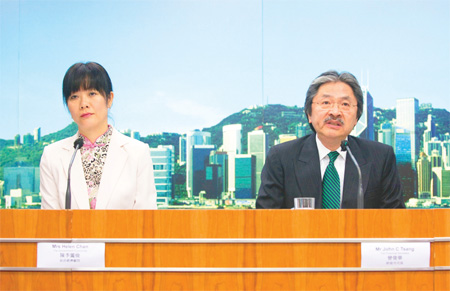New measures set to curb home prices
Updated: 2010-08-14 08:04
By Li Tao(HK Edition)
|
|||||||||
|
Financial Secretary John Tsang (right) speaks to the press while acting government economist Helen Chan listens during a news conference on Friday in Hong Kong. The city will increase the supply of land to avert an asset-price bubble after a "rare" gain in home prices, Tsang said. Jerome Favre / Bloomberg News |
Three more plots will be auctioned later this year to increase land supply
The Hong Kong government announced Friday new initiatives to curb soaring home prices including boosting land supply and restraining speculative activities by raising transaction costs, as the city faces the threat of asset bubbles forming.
The government will auction three development sites in Chai Wan on Hong Kong Island, Hung Hom in Kowloon and Fanling in the New Territories in the application list soon, regardless of whether developers table an offer, Financial Secretary John Tsang told reporters.
Under the government's application list system for land sale, a land auction will be triggered only when a developer offers no less than 80 percent of the minimum price required by the government for a lot on the list.
Two of these three sites would be auctioned in September, said Tsang, adding that some industrial sites would also be converted into residential sites later to cater to demand for smaller flats.
Aside from increasing land supply, the government also unveiled new measures to curb speculative activities in the property market.
The government will ban the resale of first-hand uncompleted flats before initial transactions are completed.
In other words, purchasers - usually speculators - of those flats will need to complete the transaction by paying all transaction fees before they can resell those flats, a move that will increase their costs and therefore discourage them from speculating.
Also, the government will require that buyers of those flats forfeit 10 percent, instead of the current 5 percent, of the total purchase price if they cancel the transactions.
"Experience indicates when the property market heats up, a lot of speculative activities take place, which will hurt the stability of our financial system when hot money withdraws from the market," said Tsang.
Tsang said the government is determined to stabilize the city's property market and will not hesitate to introduce further measures which are proved necessary.
"These measures won't hurt those real home buyers, but to add costs to speculative activities in the market," he said.
The government has previously announced various measures to stabilize home prices including boosting land supply, curbing speculative activities in the market, enhancing transparency in the first-hand market, as well as preventing excessive expansion in mortgage lending.
However, home prices keep rising, supported by historically low mortgage rates and strong demand from mainland buyers. The city's home prices have soared over 40 percent since the beginning of 2009, with prices of some luxury apartments having surpassed record highs in 1997.
"Hong Kong's home prices are becoming unaffordable to the mass public as nowadays it takes an average household 46 years to earn enough for an average 500 square-foot home in the city," CLSA's property research head Nicole Wong told China Daily in an earlier interview.
While Tsang admits home prices in some popular housing developments are approaching historical highs at a "rarely fast pace", he said he has yet to see any bubble in the market, calling all these tightening policies "preventive" measures.
"There is an increased risk of a property bubble forming because interest rates are expected to stay low for some time," he said.
"Flat prices are determined by the market. The government does not have a target for home prices," Tsang said.
Tsang warned home buyers to be cautious when borrowing money to purchase property, as their repayment burden will soar when interest rates return to a normal level.
China Daily
(HK Edition 08/14/2010 page2)
